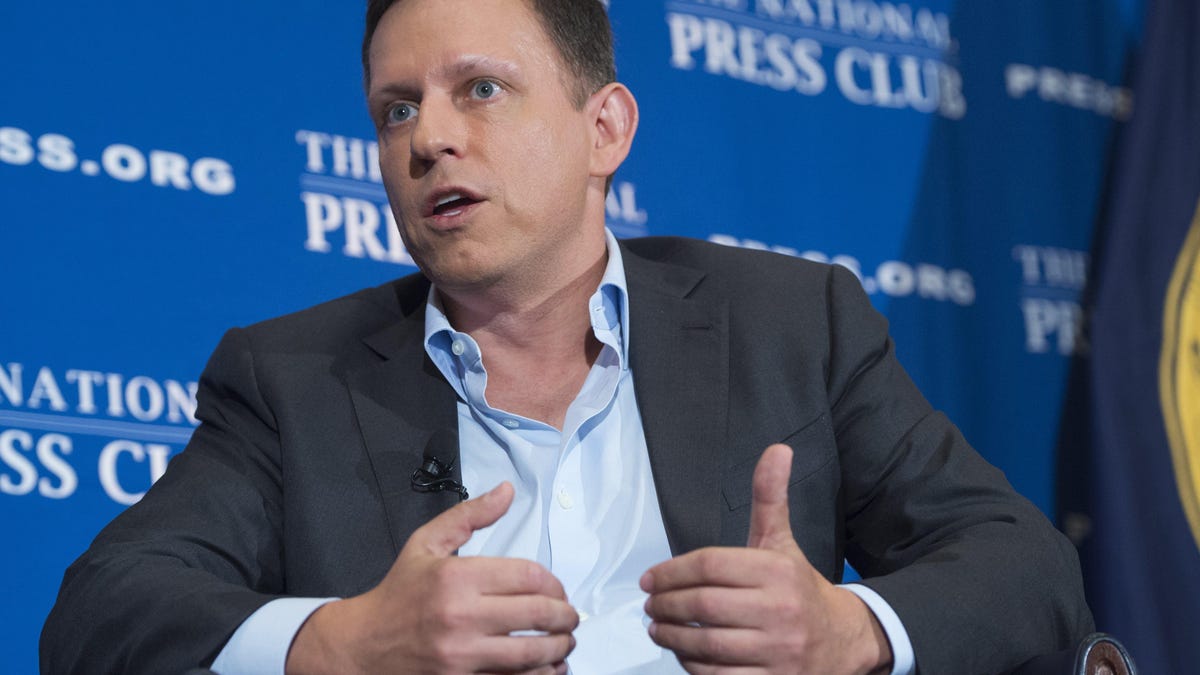Peter Thiel is totally over Silicon Valley, people
The billionaire tech investor and prominent conservative says the next Google will likely appear away from San Francisco.

Peter Thiel at the National Press Club in Washington, DC, in 2016.
During a talk at Stanford University more than a decade ago, Peter Thiel said there was a 50 percent chance the next major tech firm would come up within a 5-mile radius of the school. That company was Facebook, and it was well within that distance.
Now, the billionaire tech investor's thinking has changed. On Thursday, Thiel said the chances of another Google sprouting in Silicon Valley are markedly lower.
San Francisco and other "megacities," such as New York, simply aren't as attractive to creative entrepreneurs as they were, Thiel said. They've become too expensive, intellectually homogenous and centers of aggressively left-leaning politics, he said.
The Valley is so politically lopsided that it's become "almost totalitarian," Thiel said in an interview Thursday that was hosted by the Economic Club of New York. Sure, promising startups might head west for a year or two in a marquee accelerator, like Y Combinator, but they'll head back to wherever they came from and that's where the next big company will take root.
Thiel's comments underscore his contrarian approach to investing and politics. He's a billionaire, prominent conservative, Facebook board member and co-founder of PayPal and Palantir Technologies. He earned his fortune backing social media staples, Facebook, Yelp and LinkedIn, when they were young and unproven. He stood out from his left-leaning Valley peers by supporting Donald Trump's presidential run.
Thiel's unconventional moves and political leanings haven't come without problems for him. He's reportedly considering stepping down from Facebook's board due to political disagreements with another board member. He caught flak for becoming a citizen of New Zealand, a status that was kept out of the public for six years and wasn't revealed until he began supporting President Trump's candidacy.
The investor continues to march to the beat of his own drum. During the interview, Thiel said he opted to move to Los Angeles from San Francisco to get away.
He also thinks web companies, social media and consumer tech have been thoroughly mined. The next big thing may be in virtual reality, artificial intelligence or self-driving cars, he said. (It should be noted that Silicon Valley is actively working on all those ideas.)
"The good ideas were found pretty quickly and most of those have been explored," Thiel said about consumer-focused internet companies. "The future will be harder to predict."
Despite consumer tech's lack of potentially new ideas, he singled out Amazon as a uniquely aggressive organization, saying: "I do think Amazon is the most ferocious company in the US. It is the company you don't want to be competing against."
Thiel didn't hesitate to discuss politics during the roughly hourlong interview. He went against the Silicon Valley crowd, which largely backed Democrat Hillary Clinton during the 2016 election, giving $1.25 million to Trump's campaign and speaking at the Republican National Convention.
His support earned Thiel the president's ear on matters involving tech and innovation.
"I thought supporting Trump was one of the least contrarian things I ever did," he said. "Half the country supported him."
He also organized a summit of major tech leaders for Trump in December 2016, with attendees including Amazon CEO Jeff Bezos, Apple CEO Tim Cook and Facebook COO Sheryl Sandberg. At the meeting, Thiel sat to President Trump's left while Vice President-elect Mike Pence sat to his right.
Thiel's support for Trump doesn't appear to have wavered. "I think if he runs again he will get re-elected," he said during the interview.
He suggested Democrats may be vilifying the president too much and underestimating his popularity and ideas. He likened the situation to Republican Mitt Romney's 2012 election loss to former President Barack Obama, who was also deeply unpopular with the political opposition.
"I think Democrats are setting themselves up for an even bigger failure," Thiel added.
Thiel also defended his secret funding of lawsuits against Gawker Media, which he was angry at after its flagship site reported in 2007 he is gay. Thiel's efforts, which backed other lawsuits filed against Gawker by other people, including Hulk Hogan, eventually led to the publication filing for bankruptcy and its subsequent sale.
"I had seen them bully and mistreat people for a long time and I thought it was going to continue," Thiel said. "Someone needed to try to say that has to stop."
The Smartest Stuff: Innovators are thinking up new ways to make you, and the things around you, smarter.
Blockchain Decoded: CNET looks at the tech powering bitcoin -- and soon, too, a myriad of services that will change your life.

